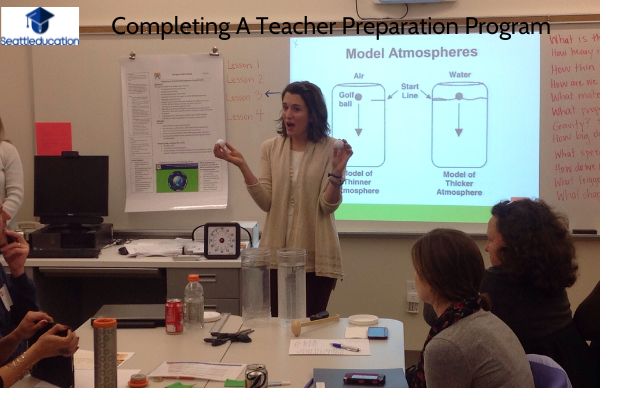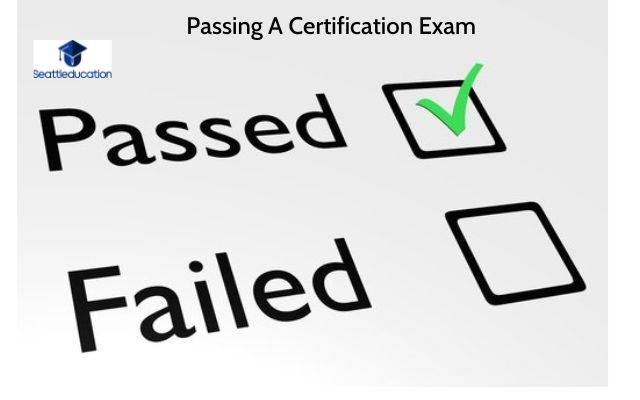Teaching Requirements: The Ultimate Guide To Follow 2023
Teaching Requirements: Teaching is an incredibly rewarding profession, but it’s also one that comes with a few requirements. Teachers must meet certain standards in order to be successful in the classroom and ensure their students are getting the best education possible.
In this article, we’ll look at what those teaching requirements are so teachers can determine if they have what it takes to succeed. It’s important for prospective teachers to understand that there isn’t just one set of criteria when it comes to becoming a teacher.
Explore more: https://seattleducation.com/teaching-requirements/
Obtaining A Bachelor’s Degree
Coursework- You’ll need to complete a certain number of credit hours of coursework to obtain your bachelor’s degree.

Academic Requirements- You’ll have to meet certain academic requirements, such as maintaining a certain GPA. Financial Aid- Don’t forget to look into all potential sources of financial aid that are available to you.
Coursework
Getting your Bachelor’s degree means meeting a lot of requirements, and one of them is coursework.
Coursework involves taking classes in various areas of study that are required for the major you chose.
You’ll have to attend lectures, complete assignments and exams, and sometimes even research papers.
It’s important to stay on top of this work throughout the semester or you could find yourself falling behind!
With careful planning and hard work, though, you can successfully meet all the coursework requirements needed to get your Bachelor’s degree.
So let’s get started!
Academic Requirements
Once you have completed your coursework and gotten all the necessary credits, there are still other academic requirements that need to be fulfilled in order to get a Bachelor’s degree.
These include passing any exams required by the university such as GREs or GMATs, maintaining a certain GPA, completing an internship or practicum if applicable, and more.
There may also be specific requirements for different majors so it is important to research what those are before enrolling in classes.
All of these will take time and effort but if done correctly they can help you achieve your goal of obtaining a Bachelor’s degree!
Financial Aid
Once all of the academic requirements have been met, it’s time to start looking into financial aid.
Financial aid can come in many forms such as scholarships, grants, loans, and work-study programs.
It is important to research each option thoroughly before applying so you can choose the best one for your needs.
Additionally, there are often deadlines that must be met when applying for these types of assistance so make sure to plan ahead!
With careful planning and good financial management skills, obtaining a Bachelor’s degree doesn’t have to be an unattainable dream.
Meeting State Requirements
Let’s talk about understanding state guidelines and complying with regulations to make sure we’re meeting state requirements.
We’ll need to be aware of any changes or updates in order to stay compliant.
Understanding State Guidelines
When it comes to teaching, understanding the state guidelines is key. Knowing what’s expected of you and your students can make all the difference in having a successful school year.
Taking the time to read up on any regulations or policies that apply to you as an educator ensures that everyone involved can have peace of mind. Without this knowledge, teachers will be left feeling overwhelmed and unprepared for the upcoming year.
With clear expectations set out by the state, there’s no reason why teachers should feel anything less than confident in their role!
Complying With Regulations
Being compliant with all regulations is essential for meeting state requirements.
We must always be mindful of the laws and rules we have to abide by as teachers, so that our students can get the best education possible.
It’s important to stay up-to-date on any changes or updates, too, so there are no surprises come time for inspections or evaluations.
Keeping track of these guidelines gives us peace of mind knowing that everyone involved is being held accountable.
With compliance firmly in place, we’ll know our classrooms and schools are running smoothly!
Completing A Teacher Preparation Program
Moving on from state requirements, completing a teacher preparation program is the next step to becoming an educator. This process can differ depending on where you are and what subject you wish to teach.

Generally, however, there will be certain courses and internships that must be completed in order for one to become certified to work as a teacher.
The courses may include topics such as psychology of learning and teaching methodology, while the internship should provide direct experience working with students inside the classroom setting.
There could also be additional components like written exams or observation hours within another school district prior to certification.
After all these steps have been taken, then comes the final stage – applying for licensure or certification with your state board of education.
In most cases, this requires submitting official documentation regarding completion of the coursework and other applicable qualifications along with transcripts and letters of recommendation.
Once everything has been approved by the relevant authorities, you will receive either a provisional license or full-time certificate so that you can begin your career as an educator!
Passing A Certification Exam
Overall, the process of obtaining a certification exam is not an easy feat. It requires considerable dedication and hard work to prepare for and pass such an important test.

Aspiring individuals must devote time to researching the best study materials available and create a comprehensive plan that allows them to stay organized and on track in order to optimize their chances at success.
Taking practice exams can be immensely helpful in providing insight into how much information should be retained as well as which areas need further improvement.
The actual day of the examination itself may feel overwhelming; however with proper preparation, one can approach it with confidence.
On-site staff are usually willing to provide assistance or answer any questions related to testing regulations or procedures.
Keeping calm and focused while staying hydrated will help ensure peak performance during the duration of the exam.
Passing these rigorous certifications is certainly no small accomplishment and provides numerous opportunities both professionally and personally moving forward.
With this newfound knowledge comes great responsibility; thus having all the necessary tools before embarking on this journey is essential for optimal results.
Applying For Certification
Let’s talk about the documentation we need to prepare for certification, and what criteria we need to meet to be eligible.
Adjust the paragraph structure in the Input to logically group complete sentences on their own lines, with a double new line after.
Preparing Documentation
Applying for certification can be daunting and overwhelming, but with the right preparation it doesn’t have to be.
Preparing documentation is one of the most important tasks when applying for any type of certification; you’ll need to ensure that all the necessary documents are collected and in order before submitting your application.
Taking the time to read up on what’s required will help you avoid costly mistakes or delays down the line.
With a little bit of research and organization, getting certified can be an exciting experience!
Meeting Eligibility Criteria
Once your documentation is in order, the next step is to make sure you meet all of the eligibility criteria.
Most certification programs have certain requirements that must be met before an application can be accepted; these could include age limits, education levels, work experience, or other qualifications.
To make sure that you’re eligible for a particular program, read up on their guidelines and double-check any information they provide.
If there’s anything that doesn’t seem quite right or if something isn’t clear, don’t hesitate to reach out for clarification – it’s better to ask now than regret later!
With everything in place and all prerequisites accounted for, you’ll soon find yourself one step closer to achieving your goal of getting certified.
Obtaining A Master’s Degree
Let’s talk about the required coursework and funding options for getting a Master’s degree.
That way, we can figure out the best way to make it happen!
Required Coursework
Obtaining a Master’s degree can be an arduous process, but for those who have the will and determination to stick with it, there is great reward.

For starters, you need to complete the required coursework which usually consists of core classes in your chosen field along with elective courses that support your major. This could range from research projects or internships depending on the school one attends.
It may sound daunting but by taking it step-by-step and breaking down complex tasks into manageable chunks, anyone can achieve their goals. And soon enough, all that hard work will pay off when you receive your diploma!
Funding Options
Once you have a good understanding of the coursework required for your degree, one should also consider their funding options.
Scholarships and grants can be a great source of financial aid, as well as taking out loans or using personal savings.
It’s important to do research into each option so that you can make an informed decision on how best to fund your educational endeavors.
There are plenty of resources available online to help with this process, making it easier than ever before to find the right avenue for financing your studies.
Working Towards Licensure
Let’s talk about the steps you need to take to prepare for licensure exams, as well as the continuing education requirements you’ll need to fulfill.
We’ll need to look into what’s needed for each of these components in order to make sure you’re on the right track.
Preparing For Exams
With the goal of obtaining a license, it’s important to be prepared for exams. It can often seem daunting and overwhelming trying to figure out what you need to study and how best to go about it.
Taking practice tests is one of the best ways to prepare – they provide invaluable insight on the types of questions that may appear on the actual exam, so you know what skills are needed in order to ace it.
Additionally, developing an effective study plan helps ensure that you don’t miss any essential topics. Breaking up your studying into manageable chunks makes it easier to focus, review material more thoroughly, and retain information better too!
With these tips in mind, you’ll be well-prepared when test day arrives.
Continuing Education
Continuing education is an important part of maintaining a license. You’ll need to stay on top of changes in your field, so you can continue providing the best services possible for clients.
Reviewing course materials and attending seminars or workshops helps keep you up-to-date with the latest developments.
It’s also worth considering taking extra classes that could help broaden your knowledge base and make you more marketable as a professional.
To ensure all requirements are met, it’s essential to check in with the relevant licensing board regularly. With dedication and commitment to learning, staying licensed will be much easier!
Maintaining Certification
Let’s talk about the requirements for maintaining certification; specifically, continuing education and professional development. How can we ensure we stay up-to-date with the latest teaching trends?
Continuing Education
When it comes to maintaining certification, continuing education is key. It’s important that professionals stay up-to-date with the latest trends in their field and refresh their skillsets on a regular basis.
This could mean taking extra classes, attending conferences or seminars, joining industry webinars, or even just reading relevant articles online.
Taking the time to invest in oneself pays off; staying abreast of current developments can help ensure professional success for years to come. The importance of continued learning should never be underestimated!
Professional Development
Professional development is another important part of keeping certification up to date. Taking courses and seminars, attending webinars, or doing research can help professionals keep their knowledge fresh and relevant in their field.
Professional development helps one stay competitive by providing them with more opportunities for growth and advancement within their field. It’s also a great way to network with other experts in the industry, which could lead to future job prospects.
Investing time into professional development pays off in the end; it allows individuals to level-up their skillset and truly stand out from the competition.
Renewing Licensure
Renewing licensure is a critical step for any professional in the field. The process can be both exciting and daunting, as it ensures that knowledge remains up-to-date and relevant to current standards of practice.
It’s important to stay on top of deadlines, requirements, and expectations when renewing your license, as this will ensure you remain compliant with state regulations.
This doesn’t have to be an overwhelming or stressful experience; by taking proactive steps such as setting reminders and staying organized, you’ll find yourself ready come renewal time without having to scramble at the last minute.
Renewal need not feel like a chore – take pride in knowing that you are doing what’s necessary to keep practicing legally and responsibly!
Completing Continuing Education
I’m trying to figure out what my continuing education requirements are; does anyone know where I can research this?
Keeping track of all the credits I need to complete can be a challenge, has anyone found a good system for doing this?
I’m really concerned about meeting all my deadlines, does anyone have any tips for staying organized?
Researching Requirements
Continuing education is an important aspect of many professions, and research into the required courses or certifications can seem daunting. However, researching these requirements doesn’t have to be difficult when you break it down into a few simple steps.
Start by looking up your profession’s governing body online – they should provide all the necessary information about what continuing education needs to be completed in order to maintain certification.
Once you’ve identified what classes are needed, look for local providers that offer them. You may even be able to find online options if there aren’t any convenient locations near you! With some planning, completing your continuing education can become much easier.
Keeping Track Of Credits
Once you’ve identified the courses that you need to take, it’s important to keep track of all the credits that you earn.
Many governing bodies require a certain number of credits in order to maintain certification, so it can be beneficial to create an organized system for yourself.
You could use a spreadsheet or simply make notes on paper – whatever works best for your situation!
Keeping track of your credits will help ensure that you meet any requirements and stay certified.
Meeting Deadlines
Staying on top of due dates is a crucial part of continuing education. Depending on your field, you may need to complete courses or other assignments within certain time frames in order to stay certified.
It’s important to keep track of the deadlines for each assignment so that you don’t miss any key steps and risk jeopardizing your certification.
Set reminders for yourself ahead of when things are due so that you can plan accordingly and make sure everything gets done on time.
With proper organization and planning, meeting deadlines doesn’t have to be stressful!
Understanding Specialty Certifications
Have you ever wondered what it takes to teach in a specialized field? Understanding the various specialty certifications and their requirements is essential for any aspiring teacher.
Let’s take a closer look at what it takes to become certified and why these credentials are important.
In order to obtain certification, applicants must pass an exam that demonstrates their knowledge in the subject area they wish to teach. This includes having experience or training in the field and understanding state regulations related to teaching.
It also involves submitting official transcripts of coursework completed as well as references from past instructors who can attest to your skillset. In addition, some states may require background checks or other tests such as psychological evaluations before granting approval for certification.
Certification serves as proof that teachers have met specific standards set forth by the state and national boards of education. The process requires completing courses, meeting certain criteria, and demonstrating competency through exams which demonstrate mastery of content material.
As such, this credential helps ensure that teachers are qualified professionals with the necessary qualifications and expertise required to provide quality instruction in their respective fields.
With proper certification, educators can feel confident that they have taken all steps necessary for success within their chosen profession!
Pursuing Advanced Degrees
As educators, we must understand the importance of specialty certifications and how they can benefit our students. With this knowledge, it’s time to take a look at pursuing advanced degrees.
Continuing one’s education is an important part of professional development and growth, especially for those in fields such as teaching that rely heavily on developing new skills and techniques.
A postgraduate degree not only provides more specialized training for teachers but also adds credibility when applying for jobs or promotions.
Advanced degrees provide many opportunities to develop a deeper understanding of both the subject matter and methodology used in teaching. Many courses focus on specific topics related to the job, such as classroom management strategies or curriculum design principles.
Additionally, there are countless elective courses available which give teachers a chance to explore other areas of interest or learning styles outside their field of expertise.
In addition to providing greater levels of knowledge and skill proficiency, earning an advanced degree can open up potential career paths beyond traditional teaching roles.
For example, administrators often require higher-level credentials than what standard teaching licenses offer; these additional qualifications may be necessary for certain positions within schools or districts. Earning a master’s degree demonstrates dedication and commitment to improving one’s craft – qualities highly valued by employers in any industry.

Comments
Post a Comment